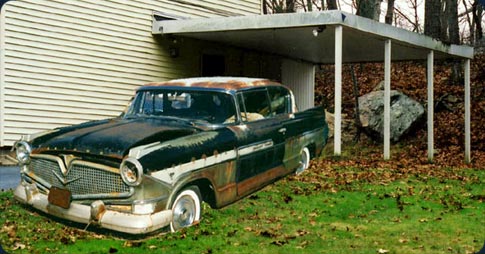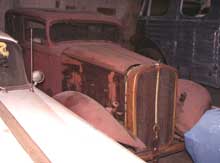I come from a Franklin family. Not descended from Ben, the Foster household had several Franklin cars during the 1920s. The last one, a 1928 sedan, was
owned by my
grandmother into the mid-1930s (interestingly, she never drove, nor did my grandfather; they had a chauffeur and in later years their children took over the driving duties.)
The H.H. Franklin company, of Syracuse, New York, built air-cooled cars from 1902 to 1934, the first being
light runabouts with transversely-mounted four-cylinder engines. Though the drive train soon took on a conventional north-south orientation, Franklins retained distinctive looks until the mid-twenties. Because a radiator was not required, the frontal appearance was entirely functional, to 1910 a “barrel front,” through 1920 as the “coal scuttle,” later the “horse collar.”
In order to look more “mainstream,” a
false radiator was adopted for 1925.
Charles Lindberg christened the new Airman model for 1928, the first Franklin with four-wheel hydraulic brakes. Amelia Earhart had one, too, and by accounts she liked it better than her
Terraplane.
Pictures of “our” Franklins have not come to light. My late father remembered that the first one was a “horse collar,” the
1928 sedan much like
Lindberg’s, which survives at The Henry Ford museum. When Franklin adopted a mascot in the 1920s, it was a
rearing lion, although in the “Lindberg era” some cars had a
Spirit of St. Louis ornament. Franklin engines were distinctive, too, all with overhead valves and
cooling ducts reminiscent of Briggs and Stratton.
Full-elliptic springs were used almost until the end.
This chassis dates from 1929, the first year of the steel frame – earlier chassis were made of wood.
By
1930, Franklins were aping the competition, and with the
Olympic model of 1933 used bodies and chassis from Reo. Times were tough, but Franklin didn’t wince, introducing a
huge 144-inch wheelbase
V12 model. It didn’t help, and after 360 cars in 1934 Mr. Franklin simply gave up.
If I were shopping for an interesting 1920s car, I’d look carefully at this
1929 Franklin
rumble seat
coupe owned by Pamela Kane. It’s an older restoration, but very
presentable and practical. Located in Connecticut, it’s currently for sale. Contact Pamela and Greg Kane for further particulars, or the H.H. Franklin Club to learn more about Franklin cars.
The Fosters haven’t given up on air cooling. What’s not to like about a car that never overheats and needs no antifreeze? My daughter Harriet, namesake of her Franklin-owning forebear, has
her own fresh-air car, inherited from her grandmother.

